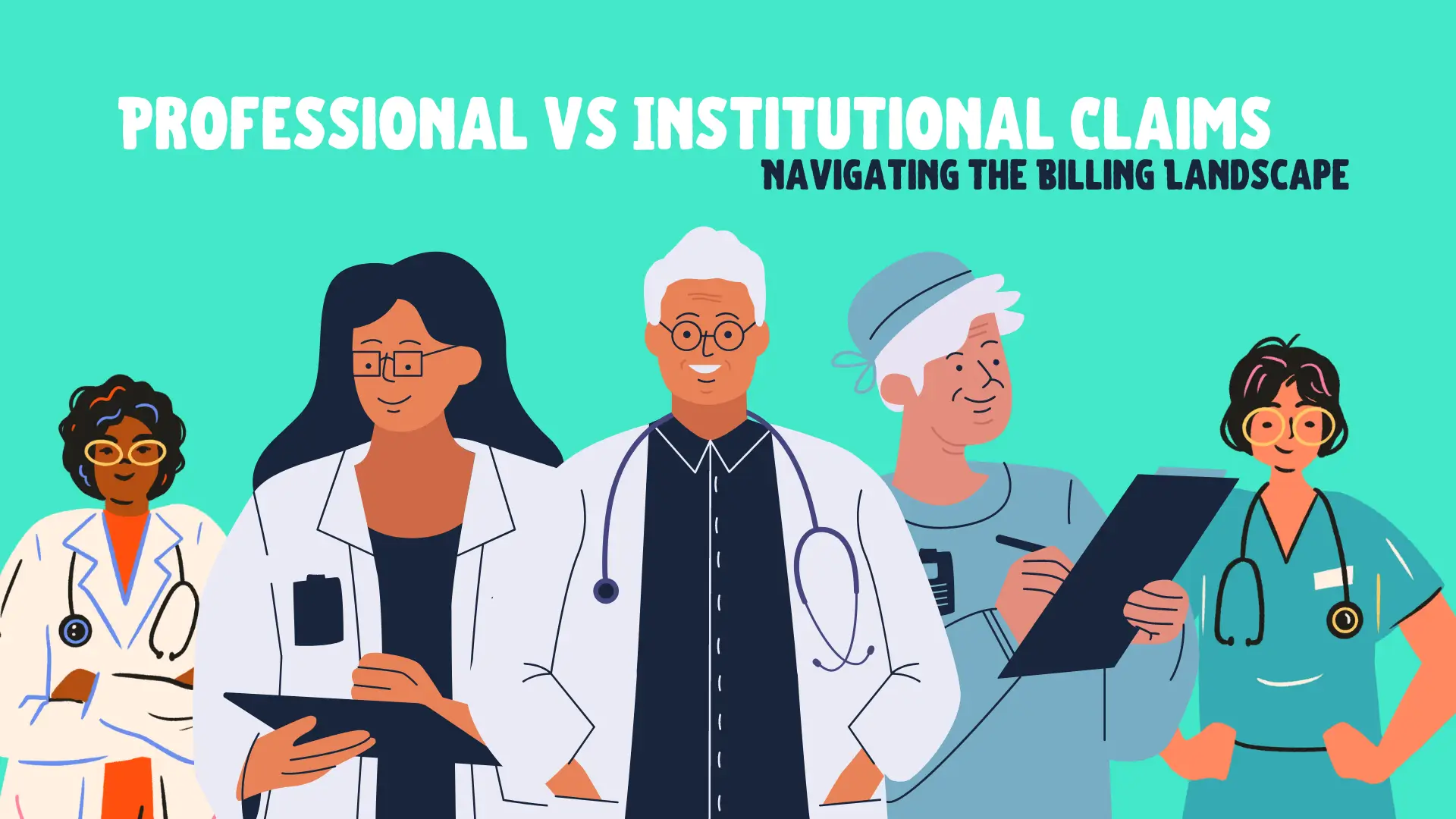In the healthcare billing industry, the distinction Professional vs Institutional Claims is a fundamental concept that affects how billing professionals process and submit claims to insurance payers. Professional claims are those submitted by individual providers or group practices for services rendered to a patient, often using the CMS-1500 claim form. These claims include details about the procedures and services performed, often in an office or clinic setting.
On the other hand, institutional claims pertain to services provided by institutions such as hospitals, skilled nursing facilities, and other inpatient or outpatient facilities. These claims use the UB-04 claim form, also known as the CMS-1450, and cover a wider range of services, including room charges, medical equipment, and supplies used during a patient’s care. The differences in claim forms and the type of information required are reflective of the varying settings and scopes of service provided by professionals versus institutions.
The processing of these claims involves navigating complex coding systems and adhering to strict guidelines set forth by insurance companies and regulatory agencies. Understanding the variations in these claims is crucial for accurate and timely reimbursement for healthcare services, which ultimately supports the financial stability of healthcare providers and access to care for patients.
Basics of Professional vs Institutional Claims
In healthcare billing, claims are submitted to insurance companies for reimbursement of services provided. There are two primary types of claims: professional and institutional.
Professional claims are submitted by individual providers or group practices for services rendered. These are documented using the CMS-1500 form, which captures patient information, diagnoses, procedures, and the services performed. Professional claims encompass services provided in various settings, including offices, clinics, and sometimes even hospitals, but always by individual healthcare professionals.
Institutional claims, on the other hand, are submitted by entities like hospitals, skilled nursing facilities, and outpatient facilities for services they provide. These claims are recorded on the UB-04 (CMS-1450) form. They cover a wider range of services, including room charges, medical equipment, and supplies, as well as any procedures performed within the facility.
Key differences include:
- Form Use: CMS-1500 for professional vs. UB-04 for institutional.
- Submitter: Individual practitioners or group practices vs. facilities.
- Services Covered: Focused on individual services vs. comprehensive institutional care.
An understanding of these fundamental distinctions is vital for accurate billing and ensuring that healthcare providers receive appropriate reimbursement from insurance payers for the services they provide.
Key Differences of Professional vs Institutional Claims
Professional and institutional claims differ in the form used for submission, the processes by which they are billed, and the specific regulatory requirements.
Claim Forms
Professional claims are typically submitted using the CMS-1500 form, which is designed for healthcare professionals to bill Medicare carriers and third-party insurers. It captures information about the patient, provider, insurance, and services provided. In contrast, institutional claims require the UB-04 (CMS-1450) form. Used by hospitals and facilities, it reports facility-based services, including inpatient, outpatient, and ancillary services.
Billing Processes
The billing process for professional claims often involves individual healthcare providers detailing services provided during patient visits. Each service is coded and billed separately, focusing on the evaluation and management of patient care. Institutional billing is concerned with the entire spectrum of patient care delivered in a facility, capturing charges for room, board, supplies, and procedures that are bundled into facility fees.
Regulatory Requirements
Regulatory requirements for professional claims include adherence to the Healthcare Common Procedure Coding System (HCPCS) for codes related to physician services, procedures, and tests. Institutional claims are regulated to ensure compliance with Inpatient Prospective Payment System (IPPS) and Outpatient Prospective Payment System (OPPS), which require accurate representation of the facility resources used in patient care.
Filing Procedures
Timely and accurate filing of healthcare claims is essential for the reimbursement process. Both professional and institutional claims adhere to specific protocols to ensure compliance and efficiency.
Professional Claims Filing
When filing professional claims, providers must use the CMS-1500 form. Key elements of the form include:
- Provider Information: The healthcare provider’s identifiers, including NPI (National Provider Identifier) and Tax ID.
- Patient Information: Complete patient demographics and insurance details.
Claims should be filed electronically through a clearinghouse to expedite processing, using EDI (Electronic Data Interchange) standards, typically formatted as ANSI 837P transactions.
Institutional Claims Filing
Institutional claims are submitted via the UB-04 (CMS-1450) form. Essential components consist of:
- Facility Information: Hospital or facility’s identifiers, like NPI and Tax ID.
- Patient and Coverage Details: Patient's full demographic and insurance policy information.
Electronic submission is the standard, facilitated through EDI, with the ANSI 837I format widely adopted for institutional claims. These electronic submissions help streamline the billing workflow and reduce errors.
Impact on Healthcare Practices
The distinction between professional and institutional claims significantly influences healthcare administration and financial processes. Professional claims (CMS-1500 forms) are used by individual providers for billing professional services. Institutional claims (UB-04 forms), on the other hand, are utilized by organizations such as hospitals and clinics.
Documentation Accuracy
- Professional: Providers must carefully document services to ensure precise billing.
- Institutional: Facilities are responsible for capturing all patient services and supplies.
When providers submit accurate claims, this streamlines the reimbursement process and reduces the likelihood of claim rejections or the need for re-submissions. For payers, this translates into a quicker, more reliable adjudication process.
Claim Processing Speed
- Professional: Typically processed faster due to simpler service structures.
- Institutional: May involve longer processing due to the complexity of services.
Payers may audit claims more frequently for institutional billing to ensure that charges are aligned with the care provided. Healthcare practices subsequently strive to maintain strict compliance standards to avoid penalties and denials.
Financial Impact
- Providers facing denied professional claims may experience direct income delays.
- Institutions deal with more significant financial repercussions due to higher service costs.

